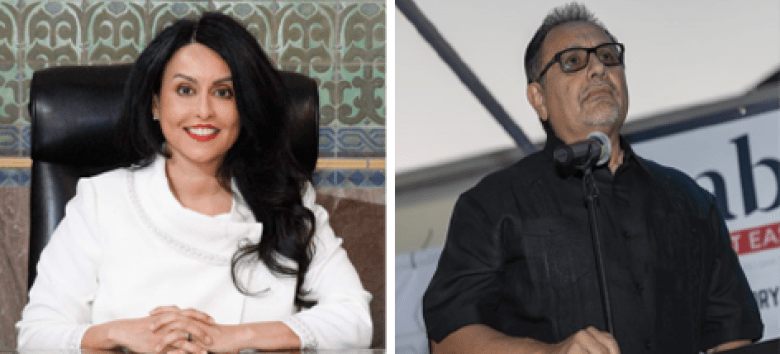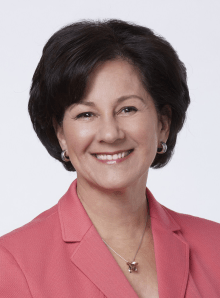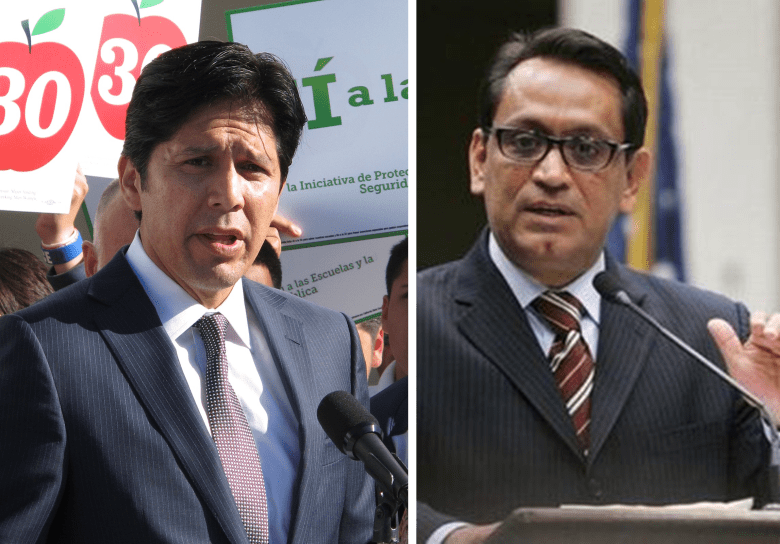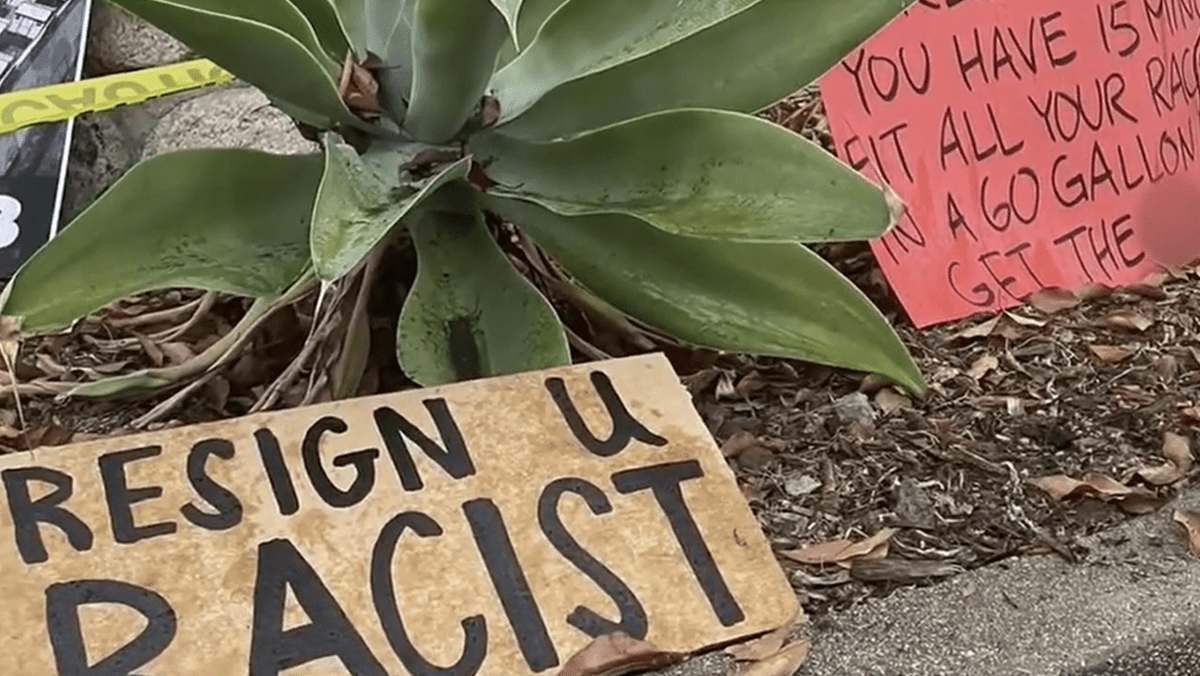Last Updated on November 2, 2022 by BVN
Phyllis Kimber Wilcox |
The crisis at the L.A. City Council continues as councilmembers Kevin de Leon and Gil Cedillo refuse to resign over disparaging comments made in an audio recording, despite being censured this week by the Los Angeles City Council.
In an open letter last week, a group of Los Angeles Latino academics and civic leaders added their voices to the growing numbers of citizens demanding the resignations of both councilmembers. The secretly recorded conversation made last year during the midst of redistricting which sparked the current controversy, was leaked to the Los Angeles Times which published its contents. As recently reported by Black Voice News, councilmembers were overhead on the tape making racist and anti-LGBTQ comments, which so far have resulted in the resignations of both Nury Martinez, the then President of the Los Angeles City Council, and Ron Herrera, the then President of the Los Angeles County Federation of Labor.

A question of legality
It is against the law in the State of California to record someone who has a reasonable expectation of privacy without their knowledge or consent. At Martinez, de Leon and Cedillo’s request, the LAPD is investigating who may have recorded the conversation. Despite the legality of what occurred however, it does not change the nature or impact of what was said and recorded.
Protests Continue

Despite public apologies made by both de Leon and Cedillo, protests which originally kept the council from meeting in person (they are back to in person meetings as of this writing) continue as well as calls for both men to resign. The President of the United States, the Governor of California and many civic groups have asked that both de Leon and Cedillo to step down. Yet, both remain in office.
Black Voice News spoke to Monica Lozano one of the civic leaders who signed the statement and asked her about the controversy.
BVN:
“Can you tell me a little bit about yourself and the work you do?”
ML:
“Historically, I’ve been involved in Spanish language media here in the city of Los Angeles for over 30 years. I was first the editor and then the publisher of the La Opinion Newspaper from about the mid 1980’s until about 2015. The vast majority of my professional life has been in media and in Los Angeles.”
BVN:
“And currently what do you do?”
ML:
“I just stepped away from [it], I had been president of a private foundation. I was working in philanthropy with an organization called College Futures Foundation which is dedicated to closing educational equity gaps for low income, first generation Black and Brown students in higher education in California. “
BVN:
“The issue of representation is important and Latinos have long been underrepresented on the City Council. Can you tell me why you think that is?”
ML:
“The composition of the Latino community in Los Angeles is very complex. We have residents at Los Angeles who have been here for generations and from about the 1980s through the mid 2000s, a lot of the population growth was fueled by immigration. So we saw a lot of new arrivals who didn’t just come from Mexico, but parts of Central America, and that combination led to a significant increase in population growth. For those who are not born in the United States, who are not automatically citizens of the U. S. they have to go through a very complicated process of gaining residency, then gaining citizenship, then becoming politically active and voting in elections in the U.S.
Many of the areas that grew in Los Angeles in terms of population have seen lesser rates of voting precisely [because of] this question of moving from immigrant status to citizens who are eligible to vote.
At the same time, when I was at La Opinion and we were watching the demographic changes across the city, we actually set a standard that it wasn’t whether or not you were a Latino running for office regardless of your background or your race or your ethnicity, you were elected to represent the residents of those communities. It was really important to us to not just advocate for Latino representation but to advocate for representation that took into account the needs of all of its residents.”
BVN:
“There’s been a lot said regarding the language used to describe and disparage various groups on the recording that began this latest crisis on the LA City Council and less about redistricting and its importance in the discussion they were having. Can you talk a little about redistricting and how it impacts the lives of people who live in those areas?”
ML:
“Sure, but let me take a step back from redistricting and talk about how important the census is because redistricting is actually an output from the decennial census. We have, unfortunately, historically had a very difficult time conducting an accurate census count in what have been called “hard to count” communities. Especially [due to] issues related to language, status, poverty and homelessness. There are just a whole range of issues which made an accurate count of communities of color to be a significant problem when you think about what comes with the census. And what comes with the census is the distribution of resources. That is why many of us have worked to ensure we are giving the right message and helping people to understand the resources that go to your local community to fund your schools, to fund your safety net social services. All of that is related to an accurate count.
In addition, redistricting, which is the drawing of boundaries [is] where communities of interest are able to exercise their political influence.
It is increasingly important that redistricting be done in a way that it is completely independent of those who are currently in elected office. Rather than prioritizing the interests of communities very often the ultimate decision maker in terms of what maps are adopted, be they at the city, the county, the state or congressional level all of those need to be done completely independent of political interference. Unfortunately what tends to happen is incumbents want to protect their districts and the composition of their districts because they are well known and they have won there versus identifying what are the communities of interest and how do you put the interest of local communities first. Redistricting is important because it will allow individuals to run and to be successfully elected in those districts and they will in turn make the final policy decisions about where resources are directed.”
BVN:
“Latino is a term used to describe a large group of people from Latin, Central and South America and represents diverse populations with diverse experiences, cultures and traditions. The same can be said increasingly for the term Black or African American. The council members had something disparaging to say about most groups including other Latinos. When people talk about fair representation, what does that look like and how do you make sure the various groups are represented?”
ML:
“For me, and I am only talking as an individual, when we are making decisions about who to elect and we are assessing their experiences, their background, their candidacies, their positions on issues we also have to ask ourselves whether or not they have demonstrated a dedication to upholding the highest ethical standards. Are they individuals of integrity? Do they see themselves as representing all of their constituents? Have they dedicated themselves to building multicultural coalitions recognizing the diversity of the city? I believe it is absolutely important to have diverse representation that aligns with the demography of the city [and] that all of those who seek it, have an opportunity to aspire to elected office.
It’s really a question to the voters. How do you assess the qualities of leadership that will make them effective in addition to race or ethnicity? This is where the profound disappointment over what we heard coming from these three electeds and the labor leader as well, is that what became most important [to them]– at least as it appeared in this tape– was racial and ethnic representation. What we have said is [that] this is not about zero sum where one group wins at the expense of another group. What we need to think about are the standards of representation that improves the lives of all of their constituents.”

BVN:
“There is a recall effort underway for de Leon. What would you like to see happen when this crisis is over?”
ML:
“I do believe Kevin de Leon needs to resign. It is interesting because the points that he has been making is that the needs of his district are significant issues of poverty, of homelessness, of safety and security, therefore the district needs representation. All of that is true but he will be ineffective in representing his district because of the lack of credibility. He can no longer seek to build alliances with other city council members. He has been stripped of his committees, has been asked by every other sitting council member to resign. In terms of effectiveness, it is impossible at this stage.
Because there’s no other avenue for removing a sitting council member other than recall, I think it is absolutely appropriate for the constituents to put that forward. Whoever seeks this office will have to learn from history, will have to learn from the unfortunate scandals that other members are now embroiled in, including those of a criminal nature.
How do you assess those who put their names forward? We all, as a city, have to come to this process of selecting candidates with a greater focus on those attributes that I mentioned earlier. There are many people who are eminently qualified and capable of exercising that kind of leadership.”
BVN:
“Do you think part of the problem is that some of the work they do could be done by other agencies?”
ML:
“I don’t have a good answer on that. One of the recommendations is the expansion of the city council. The few times it has gone to the voters it has been voted down. People see it as more government. Whether some of the decision making can be taken out of the hands of the council and put in the hands of other agencies is an interesting question.
Some of the reforms that were made for example, to put more emphasis on community involvement in the distribution of resource programs that serve you [or]serve the incarcerated. There are a number of organizations that are multi-racial, multi-ethnic. How do you make sure the best interests of the community are put forward? There’s a lot of discussion about that. Folks [looking at] it used to be called the Advancement Project now it’s called Catalyst California. They are looking into some of those questions.”
BVN:
“Is there anything else you think our readers should know?”
ML:
“What was said on that tape does not represent the generalized view of Latinos in Los Angeles, which was why it was so important for a group of Latinos to get together to say we reject it. It is not us. Those of us who have spent the greater part of our adult lifetime working to build bridges with the Black community in Los Angeles to not just acknowledge we share so many of the same issues but to actually work in coalition towards a more equitable Los Angeles is the primary focus right now, the real groundwork of community building in partnership across Black and Brown communities.”



